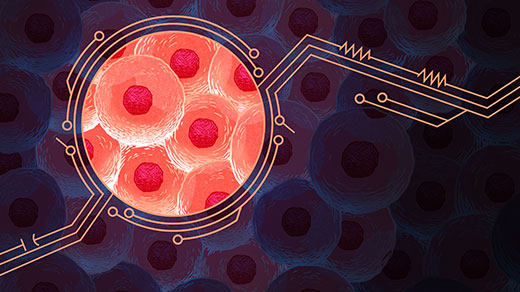What's up in
Synthetic biology
Latest Articles
Most Complete Simulation of a Cell Probes Life’s Hidden Rules
A 3D digital model of a “minimal cell” leads scientists closer to understanding the barest requirements for life.
Biologists Rethink the Logic Behind Cells’ Molecular Signals
The molecular signaling systems of complex cells are nothing like simple electronic circuits. The logic governing their operation is riotously complex — but it has advantages.
DNA Has Four Bases. Some Viruses Swap in a Fifth.
The DNA of some viruses doesn’t use the same four nucleotide bases found in all other life. New work shows how this exception is possible and hints that it could be more common than we think.
Math Reveals the Secrets of Cells’ Feedback Circuitry
Maintaining perfect stability through negative feedback is a basic element of electrical circuitry, but it’s been a mystery how cells could do it — until now.
Gene Drives Work in Mice (if They’re Female)
Biologists have demonstrated for the first time that a controversial genetic engineering technology works, with caveats, in mammals.
How Many Genes Do Cells Need? Maybe Almost All of Them
An ambitious study in yeast shows that the health of cells depends on the highly intertwined effects of many genes, few of which can be deleted together without consequence.
Tissue Engineers Hack Life’s Code for 3-D Folded Shapes
Mechanical tension between tethered cells cues developing tissues to fold. Researchers can now program synthetic tissue to make coils, cubes and rippling plates.
Is a Bigger Genetic Code Better? Get Ready to Find Out
Evolution settled on a genetic code that uses four letters to name 20 amino acids. Synthetic biologists adding new bases to DNA will be free to improve on nature — if they can.
New Model Warns About CRISPR Gene Drives in the Wild
Two new papers urge caution in using powerful genome-editing technology against invasive species: Models show that aggressive gene drives can’t be contained in the wild.








